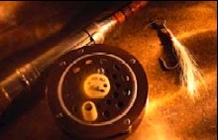Big Hole
National Battlefield is a memorial to the people who fought and
died here on August 9 and 10, 1877; combatants in a five month
conflict that came to be called the Nez Perce
Big
Hole Battle Field (photo provided by NPS)

|
War of 1877. Like
other Indian Wars in the late 1800's, the Nez Perce War involved
two very different groups with very different outlooks on land
rights, civilian authority, government powers, social
organization, and the responsibilities of the individuals to
society.
In 1992, legislation incorporated Big Hole National Battlefield
with Nez Perce National Historical Park, making it part of a
unique park consisting of 38 different sites located in five
states; Oregon, Washington, Idaho, Montana, and Wyoming. Two
Visitor Centers service the park, one at Spalding, Idaho,
11 miles east of Lewiston, and the other at Big Hole National
Battlefield, 10 miles west of Wisdom, Montana. Both
facilities are staffed year around by uniformed personnel who can
answer your questions about the local area, the Nez Perce People
and the War of 1877. Movies, museum exhibits, and guided tours are
available at both facilities covering a variety of topics on the
Nez Perce Culture and History. Although there is no Visitor Center
at Bear Paw Battlefield located in Chinook, Montana,
there is a nice display and video on the battle at the Blaine
County Museum in Chinook.
In 1877, about 750 non-treaty Nez Perce fled Idaho in the face
of demands from the US Army that all Nez Perce move onto a
reservation a fraction from the size of their traditional
homeland. The Army was enforcing a national policy of placing all
American Indians on reservations to make way for the westward
expansion of the young United States.
In early August, the non-treaty Nez Perce camped for several
days along the North Fork of the Big Hole River. They knew they
had crossed into Montana Territory, and believed they were safe
from further pursuit. Just before daybreak on August 9, 1877,
military forces attacked them as they rested after six weeks of
conflict and flight.
Although the soldiers and civilian volunteers attacked the
village while most of the Nez Perce slept, the warriors quickly
mounted a resistance and drove the military men to retreat to a
wooded hill nearby. The soldiers dug trenches for protection, but
the Nez Perce warriors surrounded the fortified hill and held the
soldiers there. Meanwhile, the older men, women and children in
the camp buried the dead and fled again.
The Battle of the Big Hole lasted less than 36 hours, yet
casualties were dreadfully high. Between 60 and 90 Nez Perce men,
women, and children were killed, most in the initial attack on the
sleeping camp. How many Nez Perce were wounded in the battle is
impossible to say, but the number is doubtlessly high. Twenty-two
soldiers, a civilian guide, and five civilian volunteers were
killed, and 39 more were severely wounded.
From the Big Hole, the Nez Perce continued to flee from the
military, traveling east through Yellowstone National Park, then
turning northward and moving toward the Canadian border. There
were several skirmishes and encounters with federal troops in the
weeks that followed the Battle of the Big Hole, but it wasn't
until early October that the US Army finally succeeded in forcing
most of the non-treaty Nez Perce to surrender. About 150 escaped
into Canada.
Most of the military men and civilian volunteers who fought at
the Big Hole returned to their posts or homes in Western Montana.
General Howard, the officer with primary responsibility for the
Nez Perce Campaign, arrived from Idaho with his troops to take up
the chase just two days after the military defeat here.
Information
provided by National Park Service
We greatly appreciate their information.


